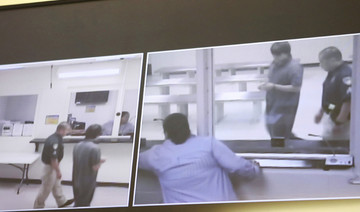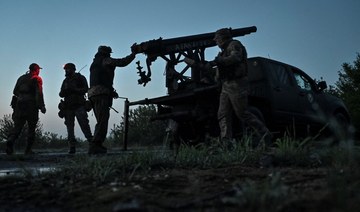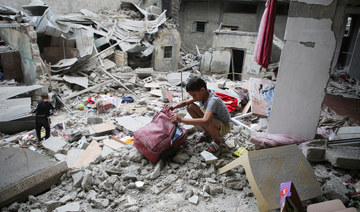MUNICH: A German court on Wednesday found the main defendant in a high-profile neo-Nazi trial guilty over the killing of 10 people — most of them migrants — who were gunned down between 2000 and 2007 in a case that shocked Germany and prompted accusations of institutional racism in the country’s security agencies.
Judges sentenced Beate Zschaepe to life in prison for murder, membership of a terrorist organization, bomb attacks that injured dozens and several lesser crimes including a string of robberies. Four men were found guilty of supporting the group in various ways and sentenced to prison terms of between 2½ and 10 years.
Presiding judge Manfred Goetzl told a packed Munich courtroom that Zschaepe’s guilt weighed particularly heavily, meaning she is likely to serve at least a 15-year sentence. Her lawyers plan to appeal the verdict.
The 43-year-old showed no emotion as Goetzl read out her sentence. A number of far-right activists attending the trial clapped when one the co-accused, Andre Eminger, received a lower sentence than expected.
Zschaepe was arrested in 2011, shortly after her two accomplices were found dead in an apparent murder-suicide. Together with the men, Uwe Mundlos and Uwe Boehnhardt, she had formed the National Socialist Underground, a group that pursued an ideology of white racial supremacy by targeting migrants, mostly of Turkish origin.
Goetzl said the trio agreed in late 1998 to kill people “for anti-Semitic or other racist motivations” in order to intimidate ethnic minorities and portray the state as impotent.
They planned to wait until they had committed a series of killings before revealing their responsibility, in order to increase the public impact of their crimes.
Goetzl said Zschaepe’s contribution was “essential for carrying out the robberies and attacks,” which couldn’t have happened without her.
Known by its acronym NSU, the group evaded arrest for almost 14 years, thanks to a network of supporters and repeated mistakes by German security agencies.
Anti-migrant sentiment that underpinned the group’s ideology was particularly strong in eastern Germany during the early 1990s, when Mundlos, Boehnhardt and Zschaepe were in their late teens and early 20s. The period saw a string of attacks against migrants and the rise of far-right parties.
Anti-racism campaigners have drawn parallels between that period and the violence directed toward asylum-seekers in Germany in recent years, which has seen the emergence of the far-right Alternative for Germany party.
The case against Zschaepe hinged heavily on the question of whether judges would hold her equally as culpable for the killings as her two dead accomplices, even though there was no evidence she had been physically present during the attacks.
Her lawyers sought to portray Zschaepe as a naive woman who played no active role in the killings, bomb attacks and bank robberies committed by Mundlos and Boehnhardt. Zschaepe rarely spoke during the five-year trial, refusing to answer questions from lawyers representing the victims’ families. Toward the end, she expressed regret for the families’ loss and described herself as “morally guilty” but urged the court not to convict her “for something that I neither wanted nor did.”
The NSU case has already become a firm part of German popular culture, serving as the basis for books, a Golden Globe-winning film and a Netflix series.
Still, Barbara John, the government’s ombudswoman for the victims’ families, said many in Germany don’t want to know the details of the case.
“That’s true, too, for immigrants who want to protect themselves psychologically from the knowledge that they live in a country which couldn’t protect them,” she told The Associated Press.
Speaking ahead of the verdict, John said the trial could help send a signal not just to far-right extremists but also to the country’s security agencies, which for years failed to consider a possible far-right motive in the 10 killings and two bomb attacks that took place across the country. Instead, police focused on whether the victims had ties to organized crime — a line of investigation for which there was never any evidence.
Germany’s interior minister, Horst Seehofer, welcomed the verdict and said that “the crimes should be a lesson and a task for us to fight far right extremism in Germany with all means needed, preventively and repressively, in the future as well.”
Families of the victims said Tuesday that the suspicion directed toward their loved-ones shook their faith in the German justice system.
“The investigation went in the wrong direction, not due to the failure of individuals but due to institutional racism,” said Alexander Hoffmann, a lawyer representing victims of a 2004 bomb attack in Cologne.
He urged federal prosecutors to continue investigating the NSU’s wider network of supporters, believed to be much broader than the four men on trial with Zschaepe.
John, the ombudswoman, said there are encouraging signs that police and intelligence agencies are beginning to listen to minorities and make an effort to recruit them, ending the long-maintained illusion that Germany isn’t a country of immigrants.
“One big question remains: Do we in Germany really want to know why and how the NSU murders occurred?” she said. “If that were the case, the work of politicians and civil society needs to continue.”
German suspect in neo-Nazi migrant targeting gang found guilty of 10 killings
German suspect in neo-Nazi migrant targeting gang found guilty of 10 killings
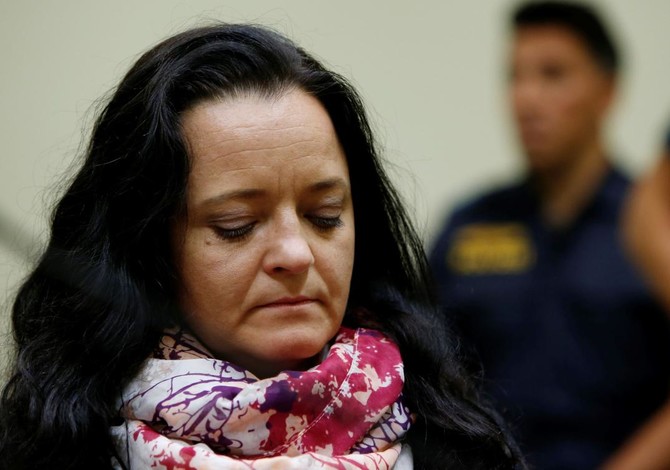
- Beate Zschaepe was sentenced to life in prison for murder, membership of a terrorist organization, bomb attacks that injured dozens and several lesser crimes including a string of robberies
- She had formed the National Socialist Underground, a group that pursued an ideology of white racial supremacy by targeting migrants, mostly of Turkish origin
Afghan Taliban’s treatment of women under scrutiny at UN rights meeting
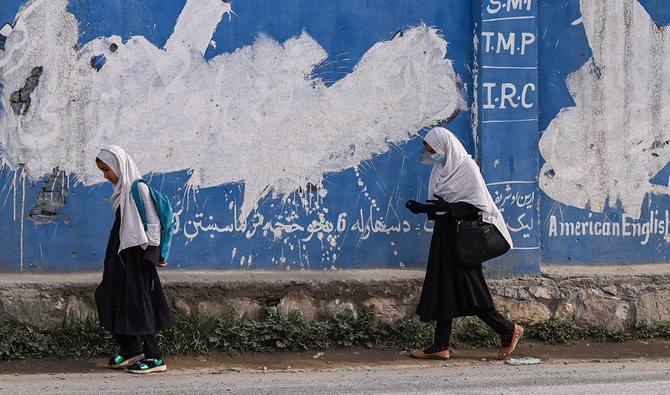
- The Taliban say they respect rights in line with their interpretation of Islamic law
- Taliban have barred girls from high school and women from universities and jobs
GENEVA: Afghanistan’s Taliban face criticism over their human rights record at a UN meeting on Monday, with Washington accusing them of systematically depriving women and girls of their human rights.
However, in an awkward first for the UN Human Rights Council, the concerned country’s current rulers will not be present because they are not recognized by the global body.
Afghanistan will instead be represented by an ambassador appointed by the previous US-backed government, which the Taliban ousted in 2021.
In a series of questions compiled in a UN document ahead of the review, the United States asked how authorities would hold perpetrators to account for abuses against civilians, “particularly women and girls who are being systematically deprived of their human rights“?
Britain and Belgium also raised questions about the Taliban’s treatment of women. In total, 76 countries have asked to take the floor at the meeting.
The Taliban say they respect rights in line with their interpretation of Islamic law.
Since they swept back into power, most girls have been barred from high school and women from universities. The Taliban have also stopped most Afghan female staff from working at aid agencies, closed beauty salons, barred women from parks and curtailed travel for women in the absence of a male guardian.
Under the US system, states’ human rights records are subject to peer review in public meetings of the Geneva-based Human Rights Council, resulting in a series of recommendations.
While non-binding, these can draw scrutiny of policies and add to pressure for reform.
The UN Human Rights Council, the only intergovernmental global body designed to protect human rights worldwide, can also mandate investigations whose evidence is sometimes used before national and international courts.
Indian students protest US envoy’s campus talk over Gaza war
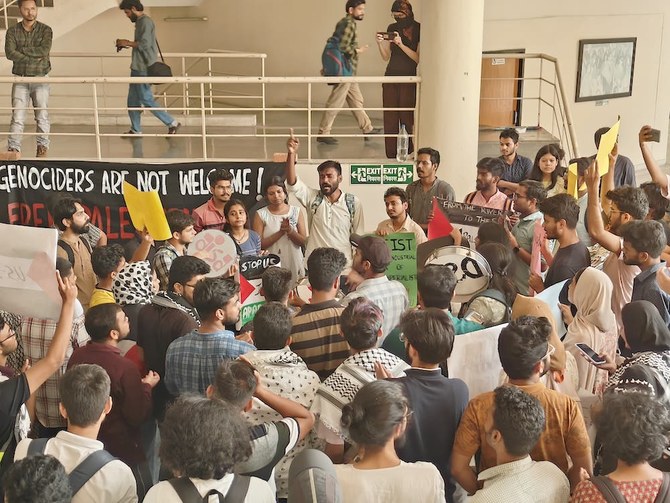
- Student-led protest led to university canceling an event involving US ambassador
- Indian students say they stand in solidarity with students protest across US
NEW DELHI: Students at one of India’s most prominent universities gathered in protest over an event involving the US ambassador to New Delhi on Monday, as they stood up against American support for Israel’s war on Gaza.
US Ambassador to India Eric Garcetti was invited for a talk on US-India ties at the Jawaharlal Nehru University in New Delhi on Monday afternoon, which would take place amid protests on American campuses demanding their universities cut financial ties with Israel over its military offensive in Gaza, which has killed more than 34,000 Palestinians.
At the university’s convention center, over 100 students organized by the Jawaharlal Nehru University Student Union protested the invitation of Garcetti, calling out his complicity “in the genocide Israel is currently doing in Palestine.”
JNUSU President Dhananjay told Arab News: “By calling such a person in the university … who is supporting the genocide, we want to tell them that JNU is not silent on this issue and we want to speak up.
“We are protesting against the US support for the genocide in Gaza committed by Israel.”
Hundreds of US college students have been arrested and suspended as peaceful demonstrations calling for a ceasefire in Gaza and divestment from companies linked to Israel spread across American campuses.
The student-led movement comes after nearly six months since Israel began its onslaught on the Gaza Strip, which Tel Aviv said was launched to stamp out the militant group Hamas.
Hundreds of thousands of housing units in the besieged territory have either been completely or partially destroyed, while the majority of public facilities, schools and hundreds of cultural landmarks have been demolished and continue to be targeted in intense bombing operations.
JNU student leaders said they stood in solidarity with the protesting students in the US.
“We are students, and we need to ask questions. If some atrocities are taking place and there are mindless killings going on, speaking out against this should be the responsibility of all sections of society,” Dhananjay said.
“The visuals that we see make us shiver and shake our conscience. If we don’t speak up, then I don’t think we have a right to be a social being.”
At the JNU campus on Monday, the student protest led to a cancellation of the event involving the US envoy.
“We feel happy that we forced the administration to cancel the talks by the ambassador,” JNUSU Vice President Avijit Ghosh told Arab News.
Despite India’s historic support for Palestine, the government has been mostly quiet in the wake of Israel’s deadly siege of Gaza.
When Indians went to the streets in the past months to protest and raise awareness on the atrocities unfolding in Gaza, their demonstrations were dispersed by police and campaigns stifled.
Members of Indian civil society have since come together to challenge their government’s links with Tel Aviv and break Delhi’s silence on Israel’s war crimes against Palestinians, reflecting similar concerns that some university students also felt.
“The US is supporting Israel in the killing of Palestinian people in Gaza. It’s also suppressing students in its country who are raising voice against the genocide in Gaza,” Ghosh said.
“We are agitated that India is being a mute spectator and not taking a clear stand against the ongoing genocide in Gaza.”
Ukraine’s Zelensky urges US to speed up weapons deliveries
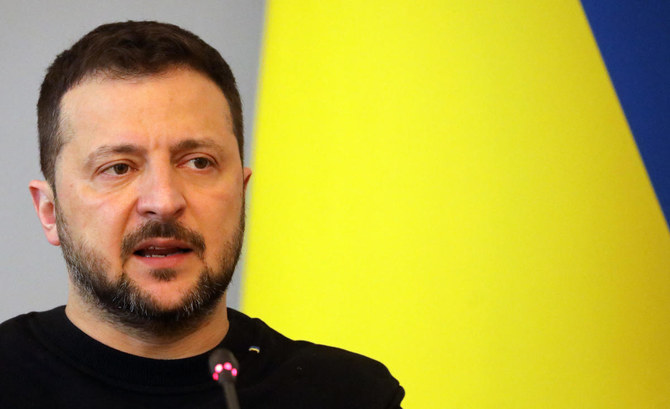
KYIV: President Volodymyr Zelensky said on Monday that vital US weapons were starting to arrive in Ukraine in small amounts and that the process needed to move faster as advancing Russian forces were trying to take advantage.
Zelensky told a joint news conference in Kyiv alongside visiting NATO chief Jens Stoltenberg that the situation on the battlefield directly depended on the speed of ammunition supplies to Ukraine.
“Timely support for our army. Today I don’t see anything positive on this point yet. There are supplies, they have slightly begun, this process needs to be sped up,” he said.
Scotland’s Humza Yousaf quits in boost to Labour before UK vote
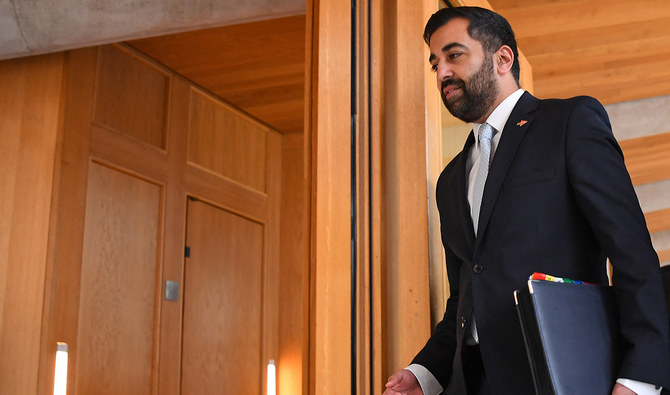
- Yousaf quit after a week of chaos triggered by his scrapping of a coalition agreement with Scotland’s Greens
- He then failed to secure enough support to survive a vote of no confidence against him expected later this week
LONDON: Scotland’s leader Humza Yousaf resigned on Monday, further opening the door to the UK opposition Labour Party regaining ground in its former Scottish heartlands during a national election expected to be held later this year.
Yousaf said he was quitting as head of the pro-independence Scottish National Party (SNP) and first minister of Scotland’s devolved government after a week of chaos triggered by his scrapping of a coalition agreement with Scotland’s Greens.
He then failed to secure enough support to survive a vote of no confidence against him expected later this week.
Resigning little over a year after he replaced Nicola Sturgeon as first minister and SNP leader, Yousaf said it was time for someone else to lead Scotland.
“I’ve concluded that repairing our relationship across the political divide can only be done with someone else at the helm,” Yousaf said, adding he would continue until a successor was chosen in an SNP leadership contest.
Yousaf abruptly ended a power-sharing agreement between his pro-independence SNP and the Green Party after a row over climate change targets. The SNP’s fortunes have faltered over a funding scandal and the resignation of Sturgeon as party leader last year. There has also been infighting over how progressive its pitch should be as it seeks to woo back voters.
Caught between defending the record of the coalition government and some nationalists’ demands to jettison gender recognition reforms and refocus on the economy, Yousaf was unable to strike a balance that would ensure his survival.
The SNP is losing popular support after 17 years of heading the Scottish government. Earlier this month, polling firm YouGov said the Labour Party had overtaken the SNP in voting intentions for a Westminster election for the first time in a decade.
Labour’s resurgence in Scotland adds to the challenge facing British Prime Minister Rishi Sunak’s Conservative Party which is lagging far behind Labour in UK-wide opinion polls.
The Scottish parliament now has 28 days to choose a new first minister before an election is forced, with former SNP leader John Swinney and Yousaf’s former leadership rival Kate Forbes seen as possible successors.
If the SNP is unable to find a new leader to command support in parliament, a Scottish election will be held. Yousaf, the first Muslim head of government in modern Western Europe, succeeded Sturgeon as first minister in March 2023. Once hugely popular, Sturgeon has been embroiled in a party funding scandal with her husband, who was charged this month with embezzling funds. Both deny wrongdoing.
Iran slams crackdown on US student protesters
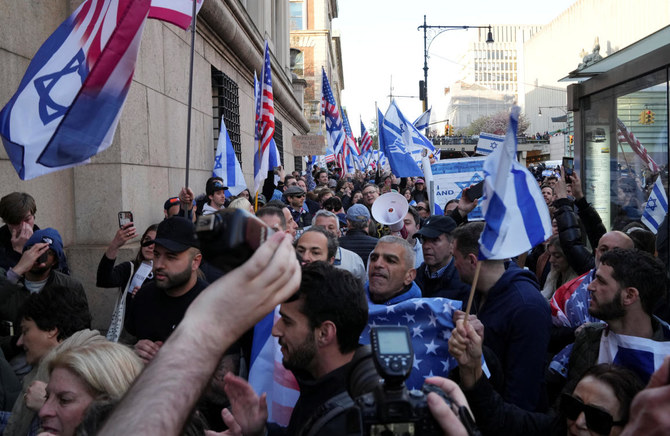
- The demonstrations began at Columbia University in New York and have since spread across the country
Tehran: Iran on Monday criticized a police crackdown in the United States against university students protesting against the rising death toll from the Israel-Hamas war in the Gaza Strip.
“The American government has practically ignored its human rights obligations and respect for the principles of democracy that they profess,” foreign ministry spokesman Nasser Kanani said.
Tehran “does not at all accept the violent police and military behavior aimed at the academic atmosphere and student demands,” he said.
American universities have been rocked by pro-Palestinian demonstrations, triggering campus clashes with police and the arrest of some 275 people over the weekend.
The demonstrations began at Columbia University in New York and have since spread across the country.
In Iran, hundreds of people demonstrated in Tehran and other cities on Sunday in solidarity with the US demonstrations.
Some carried banners proclaiming “Death to Israel” and “Gazans are truly oppressed,” state media reported.
The Gaza war broke out after the October 7 attack by Palestinian militants on Israel which killed 1,170 people, mostly civilians, according to Israeli figures.
Tehran backs Hamas, but has denied any direct involvement in the attack.
Israel’s retaliatory offensive against Hamas has since killed at least 34,488 people in Gaza, mostly women and children, according to the Hamas-run territory’s health ministry.
“What we have seen in American universities in recent days is an awakening of the world community and world public opinion toward the Palestinian issue,” Kanani said.
“It is not possible to silence the loud voices of protesters against this crime and genocide through police action and violent policies.”



